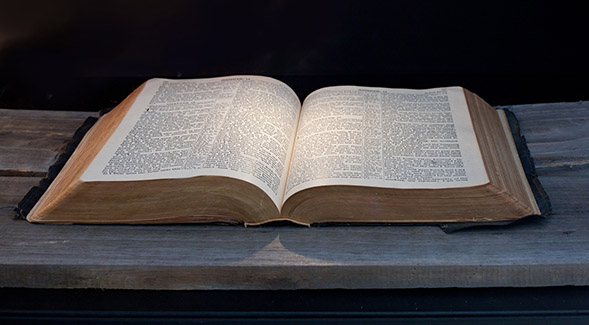A Big Change for Religious Studies
The department has changed its name to better reflect its expansive academic scope and mission.

It is now named the Department for the Study of Religion, a change that conveys the importance of understanding “how a variety of different religions function in today’s world,” chair Risa Levitt said.
Part of the College of Arts and Letters, the department focuses on some of the oldest and most enduring systems of belief while encompassing contemporary social issues, ethics, politics, history, psychology, science, literature, and the arts. Alongside traditional courses on the Bible, the Qur’an and Buddhism, the department today offers classes on Understanding Evil, Yoga Theory and Practice, and religious views of nature.
The new name, which took effect in January, had been under discussion for more than four years. Levitt said the faculty came to perceive there was “a real lack of understanding … as to what it is that we do and how you go about studying religion in a public university.”
Associate professor Drew Thomases noted “Religious Studies” may have been misinterpreted by some that the studies or instructors themselves are religious — like those at a seminary — as opposed to the secular, unbiased stance to which the department is committed.
About 50 students are currently pursuing a major or minor in the department.
“It seems to us, especially in arts and letters, to have a broad liberal arts education you need a good understanding of global religious literacy in order to conduct yourself in the world,” Levitt said.
“You need to know where other people are coming from, what shaped their views on certain issues whether it be loaded political issues or behavioral norms. The more global the world becomes, the more we as citizens are obligated to bring that sort of understanding to all of the things we do in life.”
The name change was adopted amid the 50th anniversary of the department’s spinoff from the philosophy department of what was then San Diego State College. Levitt said the department will be celebrating the milestone and recent faculty achievements at some point in the future when it’s safe to assemble as a group.
In the meantime, it asked current and former faculty members and students to share recollections of their times.
Issa Khalil, the department’s first chair, said a change in state law was required to allow public universities to teach religion as a subject and a major. The issue previously had been entangled by concerns over separation of church and state, Khalil said, even though there was no interest in teaching religious dogma.
“Many scholars, religious leaders and thinkers have made their way through the department over the past 50 years and are now guiding their own students through similar studies or working in a wide variety of related fields,” said Khalil.
Wim Mauldin (‘71), a member of the department’s first graduating class, noted the department's role in preparing students to understand the world they live in, and those that live in it with them.
“Every day we see the demonstrated results of religious ignorance and cruelty to the 'other,’” Mauldin said. “As a pastor, community organizer, and chaplain I have found my experience in the department 50 years ago was an essential foundation stone to my work in a pluralistic country and world.”
Over the years the department has drawn support and financial stability from benefactors.
Student scholarships have been made possible by Peter Dragin, a former major who established a fund named in memory of his mother, Janet. Professor Emerita Rebecca Moore and her husband, Fielding McGehee III, established a scholarship in memory of their daughter Hillary Moore.
In addition, the Rev. Stephen Mather, pastor of Coronado Community Church, left a significant planned gift to honor the legacy of his parents, Jacob and Edith Mather, by establishing faculty endowments, a lecture series, and student scholarships.
“I’m more convinced than ever that as the world is shrinking so much, it is going to be imperative for people to be exposed to traditions, ideas, and cultures,” Mather said, “and particularly religions other than their own. I think it’s great that SDSU offers a way for undergraduates to take world religion courses.”



